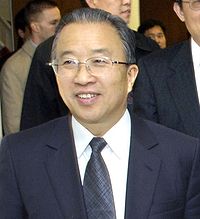- Dai Bingguo
-
Dai Bingguo
戴秉国
State Councilor of the People's Republic of China Incumbent Assumed office
March 17, 2008Premier Wen Jiabao Personal details Born March 1, 1941
Yinjiang County, GuizhouNationality Chinese Political party Communist Party of China Alma mater Sichuan University
China Foreign Affairs UniversityDai Bingguo (simplified Chinese: 戴秉国; traditional Chinese: 戴秉國; pinyin: Dài Bǐngguó; born March 1941) is a Chinese politician and professional diplomat. Since 2008, Dai has emerged as one of the foremost and highest-ranking figures of Chinese foreign policy in the Hu Jintao administration.
A graduate of Sichuan University, majoring in Russian language, Dai was instrumental in the normalization of diplomatic relations between China and the Soviet Union. Between 1989 and 1991 Dai served as the Chinese ambassador to Hungary. He then served in a succession of roles in the Department of Foreign Affairs. He currently serves as a State Councilor, director of general office of foreign affairs leadership group of CPC Central Committee, an office that acts as the primary foreign affairs organ of the Communist Party of China, and director of general office of National Security Leadership Group of the CPC Central Committee, in which he serves in the capacity as a national security advisor to the President.
Contents
Biography
Dai Bingguo was born in a village located in Yinjiang County, Guizhou Province. He belongs to the Tujia ethnic minority. He graduated from the department of foreign languages of Sichuan University, majoring in Russian, and later studied at the China Foreign Affairs University (CFAU). He joined the Communist Party of China in June 1973. He served as the Chinese Ambassador to Hungary from 1989 to 1991. He had served in the Foreign Ministry of the PRC for many years and was elevated to Vice Foreign Minister in December 1993. In June 1995, Dai was transferred from the "foreign affairs system" of the State Council to the "international liaison system" of the Central Committee of the CPC, and became Vice Director of the International Department of the Central Committee of the CPC. In August 1997, on the eve of the 15th CPC National Congress, he was promoted to Director of the International Department. In May 2003, Dai returned to the Foreign Ministry and served as Vice Minister until April 2008, being responsible for handling the North Korea nuclear crisis. In March 2008, he was appointed State Councilor and Party group member on the State Council.
On July 8, 2009, Dai replaced the Chinese President Hu Jintao at the G8 summit in L'Aquila, Italy.[1] Hu suddenly had to leave the summit because of July 2009 Ürümqi riots between Uyghurs and Han-Chinese.
In 2009, Dai was appointed by President Hu Jintao as his special representative to chair the Strategic Track of the U.S.-China Strategic and Economic Dialogue for the Chinese side.
Reputation
Former U.S. Secretary of State Henry Kissinger has called Dai "an outstanding personality" and former U.S. National Security Advisor Zbigniew Brzezinski noted that he was "a superb individual".[2]
Personal
Dai is the son-in-law of Huang Zhen, a senior Chinese diplomat, former vice Foreign Minister, Minister of Culture and first vice director of propaganda department of CPC Central Committee. He is a member of 15th, 16th and 17th Central Committees of Communist Party of China.
External links
- Dai Bingguo's profile at people.com.cn (Chinese)
References
- ^ "Chinese President Hu Jintao cancels G8 attendance". MarketWatch. 2009-07-10. http://www.marketwatch.com/story/chinese-president-hu-jintao-cancels-g8-attendance. Retrieved 2009-07-10.
- ^ http://www.charlierose.com/view/interview/10202#frame_top
Senior members of the State Council of the People's Republic of China Premier 
Vice Premiers State Councilors Secretary-General Categories:- Living people
- 1941 births
- People from Guizhou
- Politicians of the People's Republic of China
- Diplomats of the People's Republic of China
- Sichuan University alumni
Wikimedia Foundation. 2010.
